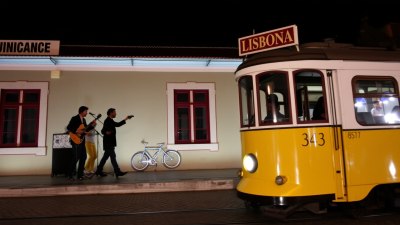Lisbon's Fado Nights: Melancholy Melodies and Soulful Stories
Explore the enchanting world of Fado in Lisbon, filled with soulful melodies and captivating stories.

Image created with Flux Schnell
Lisbon, the vibrant capital of Portugal, is not just renowned for its stunning architecture, iconic trams, and breathtaking views. It is also the birthplace of Fado, a traditional genre of music that encapsulates the soul of the Portuguese. Fado, which means ‘fate’ in Portuguese, is deeply rooted in Lisbon's neighborhoods, particularly the historic districts of Alfama and Bairro Alto. A Fado night in Lisbon is more than just an event; it is an experience steeped in history, emotion, and the compelling stories of its people.
The Origins of Fado
Fado originated in the early 19th century and is thought to have been influenced by a variety of musical forms including traditional Portuguese, Moorish, and African sounds. Initially, it was performed in the streets and taverns of Lisbon by sailors, who would sing about their longing for home, love lost, and the sea. The genre gained popularity in the 20th century, becoming a symbol of Portuguese identity. Fado's passionate and melancholic tones resonate with the concept of 'saudade,' a unique Portuguese word that expresses a deep emotional state of nostalgic longing for something or someone absent.
The Experience of a Fado Night
A typical Fado night involves visiting a traditional 'casa de fado' (Fado house) where you can immerse yourself in this soulful music while enjoying delicious Portuguese cuisine. Upon entering, you are often welcomed with a warm ambiance, inviting laughter, and the aroma of grilled sardines or bacalhau à brás, a popular codfish dish.
The Fado performance usually involves a singer accompanied by classical guitar and a Portuguese guitar, creating an enchanting soundscape that captures the audience's attention. As the lights dim, the singer, often clad in traditional attire, takes the stage and begins to tell their story through song. Each Fado performance is not just about the music; it is a journey into the heart and soul of Portuguese culture.
The vocalists, known as fadistas, are key to the Fado experience. Their voices are filled with raw emotion, capable of evoking tears or smiles within minutes. Each fadista has their unique style and interpretation, bringing their life experiences and emotions to the performance. Many singers offer personal stories woven into their melodies that often reflect themes of love, loss, and longing.
Many notable Fado singers have emerged from Lisbon, such as Amália Rodrigues, who is often regarded as the Queen of Fado. Her powerful voice and ability to infuse emotion into her songs elevated Fado to international acclaim. Today, contemporary artists continue to honor this tradition while introducing new elements that attract the attention of younger audiences.
The Best Places to Experience Fado in Lisbon
While there are countless places to enjoy Fado in Lisbon, some venues stand out for their authenticity and atmosphere. In Alfama, you can visit 'Clube de Fado,' which offers traditional Fado performances in a cozy setting, making you feel like you’re part of the history. Another outstanding location is 'Sr. Fado de Alfama,' where you can experience live performances while savoring delightful Portuguese dishes. In Bairro Alto, places like 'A Tasca do Chico' showcase emerging Fado talent in an intimate and lively atmosphere.
Dining and Fado: A Perfect Pairing
A Fado night is not complete without indulging in local cuisine. Traditional dishes such as 'bacalhau,' grilled sardines, and various Portuguese wines enhance the overall experience. Many Fado houses offer a set menu featuring local specialties, allowing guests to enjoy a quintessential Portuguese meal while being serenaded by soulful tunes. The pairing of gastronomy and Fado creates a multi-sensory experience that truly embodies the heart of Lisbon.
The Role of Fado in Contemporary Culture
Fado remains an integral part of Portuguese culture, constantly evolving while maintaining its rich heritage. Recent years have seen the rise of modern interpretations, where contemporary artists blend Fado with other musical genres, such as jazz and pop, attracting a more diverse audience. The annual ‘Fado na Baixa’ festival celebrates this evolution, showcasing various artists and highlighting the significance of Fado in today’s music scene.
Moreover, UNESCO recognized Fado as an Intangible Cultural Heritage in 2011, affirming its significance to Portugal’s cultural identity. This acknowledgment has not only elevated its status but also encouraged efforts to preserve this cherished tradition for future generations.
Fado and the Lisbon Experience
Engaging with Fado in Lisbon offers visitors a rare glimpse into the emotional tapestry of the city’s culture and history. Each note, each story sung by a fadista takes you deeper into the soul of Portugal, making it an unforgettable experience. The intense emotions conveyed through this art form highlight the universal connections we share through love and loss, reminding us of our common humanity.
Visitors to Lisbon often leave changed by the experience of a Fado night. Embarking on a journey through sound and story, they return home with memories that echo the melancholic beauty of the performances. In essence, a Fado night is not merely about music; it's about connection, culture, and the celebration of life’s bittersweet moments.
Preparing for Your Fado Night
If you find yourself in Lisbon, here are a few tips to ensure you have the ultimate Fado experience. Firstly, consider making a reservation, as the best places can fill up quickly, particularly during the tourist season. Dress comfortably while keeping in mind the ambiance; many Fado houses appreciate a smart-casual dress code.
Additionally, it might be worth arriving early to enjoy your meal without feeling rushed before the show begins. Engaging with the staff or asking questions about the music and artists can enhance your experience, as many Fado enthusiasts love to talk about their passion. Lastly, don’t shy away from expressing your appreciation for the performance; clapping and cheering are encouraged and add to the overall electric atmosphere during a show.
The Lasting Impact of Fado
The allure of Lisbon's Fado nights lies in their ability to evoke a sense of nostalgia and belonging. Through the art of storytelling, Fado transcends time and space, connecting people across generations and cultures. As one experiences the soulful melodies and heartfelt narratives of Fado, they partake in a legacy that continues to shape the identity of Lisbon and, indeed, of Portugal itself. A visit to Lisbon is incomplete without embracing its Fado nights—an invitation to listen, reflect, and connect with the bittersweet melodies that echo through the city's streets.











